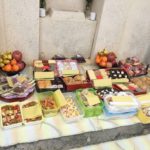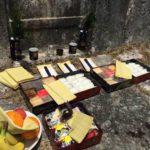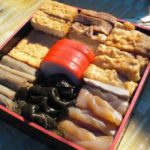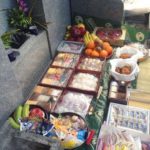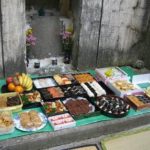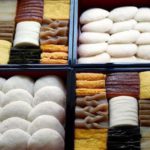清明祭, シーミー or しーみー: shiimii (also Romanized as “shimi”) in Okinawan language. In Japanese it is pronounced Seimei-sai.
Shiimii season is will come to Okinawa around April (in the third lunar month). Even though I think you are supposed to hold the ritual around the 15th day after the Spring Equinox, most Okinawan people are on “island time” and just do it any time during the month that it is convenient for everybody to meet up or whenever the weather is good. I don’t know that there are many clear rules as to when, but generally these gathering start April 4th. I remember one of my students last year said that she was so busy during the month and was barely able to organize a small gathering at the family grave on the very last weekend of April.
It is an event to worship the ancestors, originating from China. The tombs are cleaned up and family members come together to kneel in front of the tomb, providing offerings to the ancestors and bringing along food dishes to have a small gathering/party in front of the tomb. This is one of the major observances in Ryukyuan customs, though it is mostly observed in the the central and southern areas.
Featured in the stores you will see lots of materials for packing family bento boxes, packages of mochi, fruits, items for the graves (including uchikabi, paper money, that is burned so ancestors have money in the afterlife), cleaning items, and other things necessary for a family picnic. The ads will be up soon to pre-order Okinawan-style hors d’oeuvre platters. They will look similar to the platters during New Years and Obon, with many of the same foods. These boxes are called usanmi ウサンミ.
During the month of April, you will see cars parked all along the road in Okinawa, and lots of people picnicking by the ancestor graves. I can usually tell when the season is in full swing, due to the slow traffic and the number of not-quite-legally-parked cars spilling into the main road. It is a time to remind yourself as an “outsider” to be patient, and to appreciate the preservation of culture. Usually weekends (Sundays) are the busiest days to hold these gatherings.
